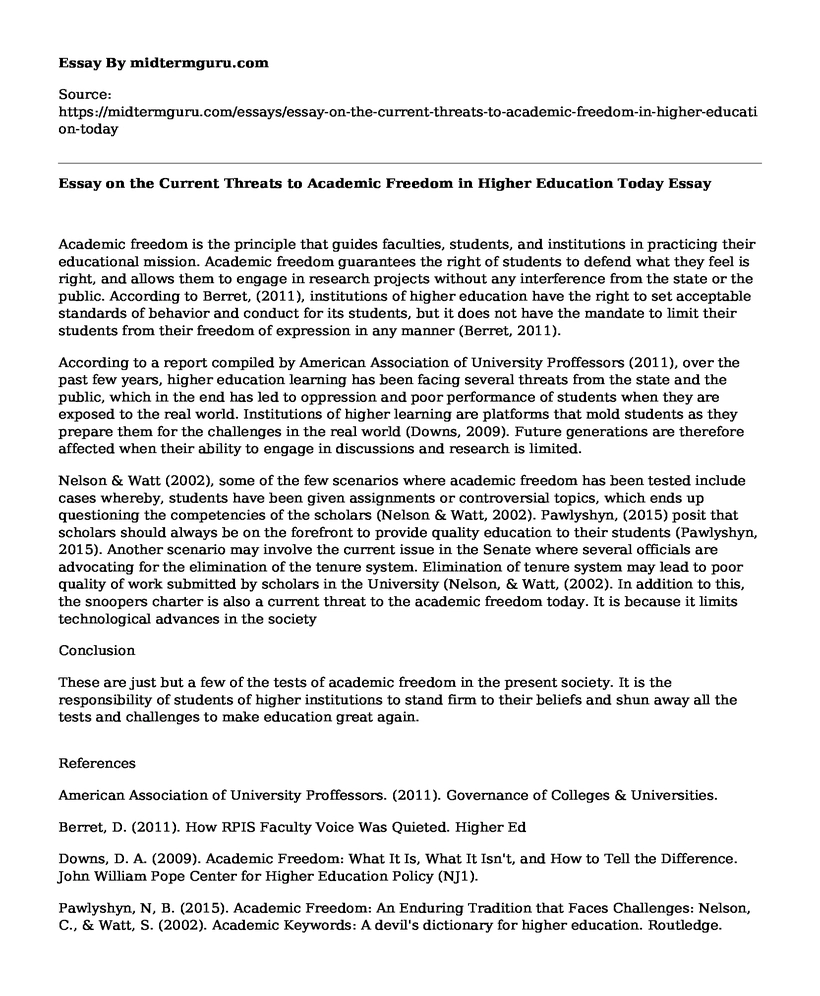Academic freedom is the principle that guides faculties, students, and institutions in practicing their educational mission. Academic freedom guarantees the right of students to defend what they feel is right, and allows them to engage in research projects without any interference from the state or the public. According to Berret, (2011), institutions of higher education have the right to set acceptable standards of behavior and conduct for its students, but it does not have the mandate to limit their students from their freedom of expression in any manner (Berret, 2011).
According to a report compiled by American Association of University Proffessors (2011), over the past few years, higher education learning has been facing several threats from the state and the public, which in the end has led to oppression and poor performance of students when they are exposed to the real world. Institutions of higher learning are platforms that mold students as they prepare them for the challenges in the real world (Downs, 2009). Future generations are therefore affected when their ability to engage in discussions and research is limited.
Nelson & Watt (2002), some of the few scenarios where academic freedom has been tested include cases whereby, students have been given assignments or controversial topics, which ends up questioning the competencies of the scholars (Nelson & Watt, 2002). Pawlyshyn, (2015) posit that scholars should always be on the forefront to provide quality education to their students (Pawlyshyn, 2015). Another scenario may involve the current issue in the Senate where several officials are advocating for the elimination of the tenure system. Elimination of tenure system may lead to poor quality of work submitted by scholars in the University (Nelson, & Watt, (2002). In addition to this, the snoopers charter is also a current threat to the academic freedom today. It is because it limits technological advances in the society
Conclusion
These are just but a few of the tests of academic freedom in the present society. It is the responsibility of students of higher institutions to stand firm to their beliefs and shun away all the tests and challenges to make education great again.
References
American Association of University Proffessors. (2011). Governance of Colleges & Universities.
Berret, D. (2011). How RPIS Faculty Voice Was Quieted. Higher Ed
Downs, D. A. (2009). Academic Freedom: What It Is, What It Isn't, and How to Tell the Difference. John William Pope Center for Higher Education Policy (NJ1).
Pawlyshyn, N, B. (2015). Academic Freedom: An Enduring Tradition that Faces Challenges: Nelson, C., & Watt, S. (2002). Academic Keywords: A devil's dictionary for higher education. Routledge.
Nelson, C. (2016). Academic Freedom in Palestinian Universities. Telos, 2016(177), 219-239. doi:10.3817/1216177219
Cite this page
Essay on the Current Threats to Academic Freedom in Higher Education Today. (2021, Jun 04). Retrieved from https://midtermguru.com/essays/essay-on-the-current-threats-to-academic-freedom-in-higher-education-today
If you are the original author of this essay and no longer wish to have it published on the midtermguru.com website, please click below to request its removal:
- School Counselors and Student Confidentiality Essay Example
- Exams as a Measure of Students Abilities - Education Essay Example
- Does Language Shape the Mind? - Paper Example
- Paper Example on Behavioral Issues for Deaf and Hard of Hearing Students
- The Directed Reading-Thinking Activity - Paper Example
- How Teachers Can Control Student-Led Projects in Modern Schools - Essay Sample
- Homelessness & College Students: Exploring the Issue & Solutions - Research Paper







